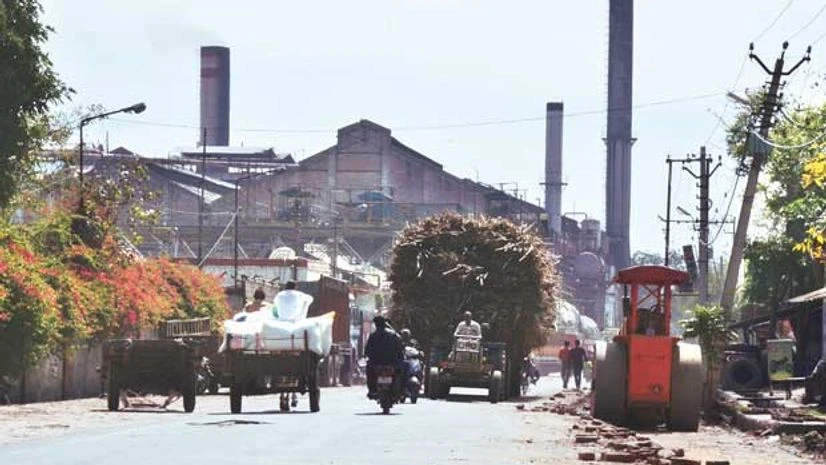Feared with penal action, sugar mills in Maharashtra have taken the Union food ministry to court, alleging the government is forcing them to incur losses.
Around 50 large mills, mostly corporations linked with various political parties in Maharashtra, have failed to meet the ministry’s directive under which mills needed to bring down their stocks to 37 per cent of last year’s stock by September 30, as notified by the ministry early last month. These mills have a cumulative production capacity of 35-40 per cent of sugar output in the state.
Initially, they asked the ministry for an extension in the time for adhering to the stock limit; this was denied. Now, these mills have petitioned the high court here for a three-month extension to seel the extra sugar. The next hearing is on Friday.
The ministry circular on September 8 asked mills to reduce their stock to 37 per cent of last year’s by September 30 and 24 per cent by October 31. This was to curb hoarding and a rise in prices. To achieve this, mills say they were required to offload at least 1.2 million tonnes of stock in the market within 22 days, more than the double the quantity the market could absorb.
A price crash was inevitable. Private mills hastened to sell but corporations linked with political parties held on, confident they could use their links to get an extension.
“The period fixed by the government was too short to meet. Mills in Maharashtra have a different dynamic than their counterparts in Uttar Pradesh. Maharashtra is surrounded with sugar producing states and, hence, they need to sell their produce to eastern and north-eastern states. Selling a large quantity in a short period becomes difficult. By contrast, UP is encircled with consuming states and mills do not face too much of problem to offload a large quantity in any time frame. Sugar consumption in Maharashtra is very low,” said Sanjiv Babar, managing director, Maharashtra State Co-operative Sugar Factories Federation.
A senior mill executive said there were no takers for the sugar. Transport problems had multiplied the difficulties in clearing of stocks.
Meanwhile, the ex-mill sugar price is down Rs 1-1.50 a kg over the past month to Rs 32-32.50 a kg in Maharashtra, which the mills say is Rs 1-2 a kg lower than the cost of production. Also, the government has restricted its export by levying duty.
“The government’s major objective was to keep sugar prices under check during this festive season, which it has achieved. So, we don’t think the government is going to push for sugar mills’ compliance to its order in the court,” said a senior industry official.
Around 50 large mills, mostly corporations linked with various political parties in Maharashtra, have failed to meet the ministry’s directive under which mills needed to bring down their stocks to 37 per cent of last year’s stock by September 30, as notified by the ministry early last month. These mills have a cumulative production capacity of 35-40 per cent of sugar output in the state.
Initially, they asked the ministry for an extension in the time for adhering to the stock limit; this was denied. Now, these mills have petitioned the high court here for a three-month extension to seel the extra sugar. The next hearing is on Friday.
The ministry circular on September 8 asked mills to reduce their stock to 37 per cent of last year’s by September 30 and 24 per cent by October 31. This was to curb hoarding and a rise in prices. To achieve this, mills say they were required to offload at least 1.2 million tonnes of stock in the market within 22 days, more than the double the quantity the market could absorb.
A price crash was inevitable. Private mills hastened to sell but corporations linked with political parties held on, confident they could use their links to get an extension.
| BITTER SWEET |
|
“The period fixed by the government was too short to meet. Mills in Maharashtra have a different dynamic than their counterparts in Uttar Pradesh. Maharashtra is surrounded with sugar producing states and, hence, they need to sell their produce to eastern and north-eastern states. Selling a large quantity in a short period becomes difficult. By contrast, UP is encircled with consuming states and mills do not face too much of problem to offload a large quantity in any time frame. Sugar consumption in Maharashtra is very low,” said Sanjiv Babar, managing director, Maharashtra State Co-operative Sugar Factories Federation.
A senior mill executive said there were no takers for the sugar. Transport problems had multiplied the difficulties in clearing of stocks.
Meanwhile, the ex-mill sugar price is down Rs 1-1.50 a kg over the past month to Rs 32-32.50 a kg in Maharashtra, which the mills say is Rs 1-2 a kg lower than the cost of production. Also, the government has restricted its export by levying duty.
“The government’s major objective was to keep sugar prices under check during this festive season, which it has achieved. So, we don’t think the government is going to push for sugar mills’ compliance to its order in the court,” said a senior industry official.

)
